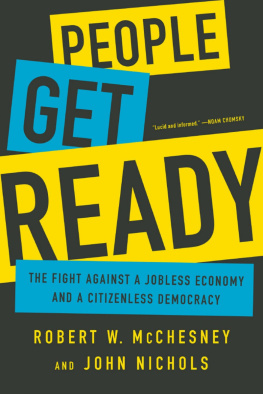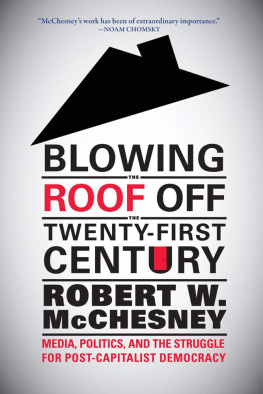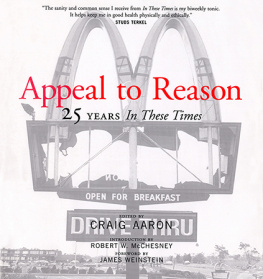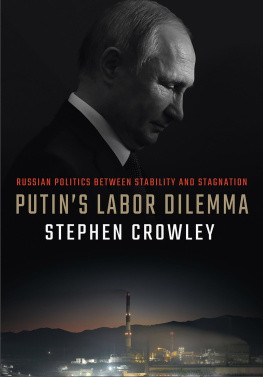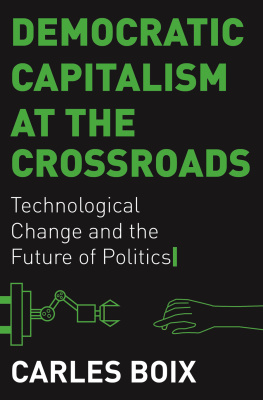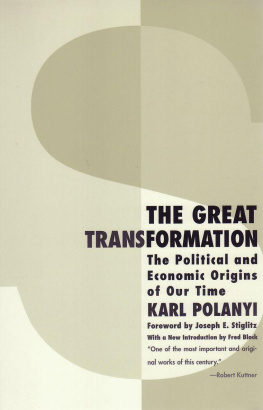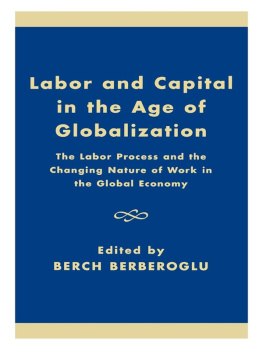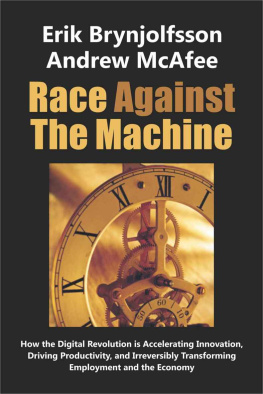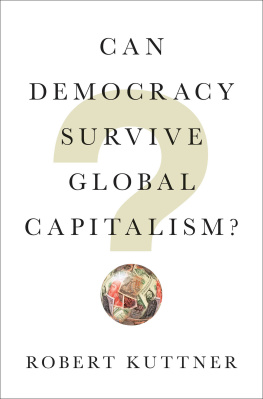

Copyright 2016 by Robert W. McChesney and John Nichols
Published by Nation Books, A Member of the Perseus Books Group 116 East 16th Street, 8th Floor, New York, NY 10003
Nation Books is a co-publishing venture of the Nation Institute and the Perseus Books Group
All rights reserved. Printed in the United States of America. No part of this book may be reproduced in any manner whatsoever without written permission except in the case of brief quotations embodied in critical articles and reviews. For information, address the Perseus Books Group, 250 West 57th Street, 15th Floor, New York, NY 10107.
Books published by Nation Books are available at special discounts for bulk purchases in the United States by corporations, institutions, and other organizations. For more information, please contact the Special Markets Department at the Perseus Books Group, 2300 Chestnut Street, Suite 200, Philadelphia, PA 19103, or call (800) 810-4145, ext. 5000, or e-mail .
DESIGNED BY LINDA MARK
Library of Congress Cataloging-in-Publication Data
Names: McChesney, Robert Waterman, 1952 author. Title: People get ready: the fight against a jobless economy and a citizenless democracy / Robert W. McChesney and John Nichols.
Description: New York: Nation Books, [2016] | Includes bibliographical references and index.
Identifiers: LCCN 2015040784
Subjects: LCSH: United States--Economic conditions--2009- | United StatesSocial conditions. | United StatesPolitics and
government2009
| Democracy--United States. | LaborUnited States. | Technological innovationsEconomic aspectsUnited States.
Classification: LCC HC106.84 .M3973 2016 | DDC 320.973dc23 LC record available at http://lccn.loc.gov/2015040784
ISBN: 978-1-56858-522-2 (e-book)
10 9 8 7 6 5 4 3 2 1
CONTENTS
For Amy, Lucy, and Whitman


In the foolishness of their hearts they imagined that the maintenance and well-doing of the industrious poor were of greater consequence than the enrichment of a few individuals.
LORD BYRON, 1812
T HE FUTURE IS NOW. HERES HOW IT WORKS. A CHIP IMPLANTED in your finger (its about the size of a grain of rice, you wont even remember that its there) is going to open the door and start the ignition of the driverless car that will take you to the drive-thru window of a restaurant where youll grab the breakfast you ordered, paid for, and scheduled for pick up with a phone app. Next stop: the community college job retraining center where you have been required to put in a few hours each week since automation wiped out your part-time job at the last plant still making anything in whats left of your hometown. The center is pretty much empty; has been ever since the last big free-trade deal was approved and people started to realize that the good-paying jobs werent coming back. Besides, most training is done online now, with instructors working from the distant call centers of offshored multinational corporations. A pleasant if rather too-well-armed security guard informs you that the center will be closing next week. You ask her what she will do next. I dont know, she answers. Im not in charge.
It is not think different or be whats next or lean forward that is the defining statement of the future that is now. It is that last line: Im not in charge. We are not in charge. In the midst of a technological revolution that is every bit as disruptive as the industrial revolution of two hundred years ago, the gadgets are all new, but the power relations are all old. Were back to the Gilded Age, back to the age before the Gilded Age, back to a future of plutocrats and peasants, of masters and servants. We are told that this is a time of income inequality, and it is. But it is also a time of power inequality, where the ability to determine what the future will look like and feel like and sound like and taste like is concentrated in fewer and fewer hands. Every decision that matters about our lives is being made by a corporate CEO or a campaign donor or a programmer or a hacker or someone else we have never met. We choose politicians by rote after elections so crude in their messaging and so vapid in their content that most of us do not bother to participate in them. The politicians themselveswith the exception of an occasional Bernie Sanders or Elizabeth Warrenhave become rubberstamps for the trade deals, tax rates, and deregulations demanded by an enriched and empowered one-tenth of one percent. The rest of us are mere spectators. Many of us are not even aware that the game we are watching isnt entertainment, isnt virtual reality. It is our lives.
Americans, like peoples across the world, must understand what is at stake in this time of change. This book will speak about new technologies, about virtual reality, about digital destinies, about the automation of everything, and about the moment, not far from now, when all the trends of the future that is now give way to what comes next. Some things we know will occur. Tens of millions of Americans who have the education, the training, and the ethic to do what we thought would be the work of a modern age will no longer be able to find that work. They will, as economist James Galbraith explains, be not only unemployed but also obsolete. Some of the disrupted and the discarded have felt obsolete for years, as they have slipped down the economic ladder from the assembly line to the warehouse to the convenience-store counter to the fast-food prep station. But their experience is being generalized. We will begin to recognize that what comes after the acceleration of automation that is only now beginning will not be some new way of working, some new industry, some new sector of the economy. The genius of the digital revolutionwith all of its apps and smart technologies and advances in automation, with all of its blurring of lines between humans and machines, with all of its progressis its exceptional efficiency. The changes that define the future that is now have nothing to do with job creation. Why would they? They are being developed and implemented by behemoth corporations that seek to maximize profits, not employment.
Despite what five justices on the United States Supreme Court might imagine, corporations are not people.
Yes, of course, thats a dystopian notion. But, remember, we live in the future that is now. Every day a virtual reality becomes just plain reality. There are miracles and there are marvels, but there are also reminders of what made those old science-fiction films so scary. What could be imagined, what can be imagined, is happening. Young men really are inserting grain-of-rice-sized microchips in their fingers in order to unlock doors and start carshoping that they will increase their employment prospects.
This is the story of now. And much of it is very fine, indeed. There is nothing wrong with disrupting drudgery, nothing wrong with making it easier to communicate, nothing wrong with trying new approaches that might work better than what came before.
But there is something wrong, something that is destructive rather than disruptive, something that is simply absurd about engaging in the wishful thinking that says a capitalistic system that by its nature prioritizes profit will somehow evolve for the better. It does not work like that. It never has and it never will.
Next page
